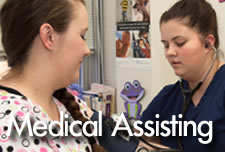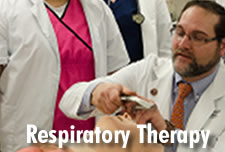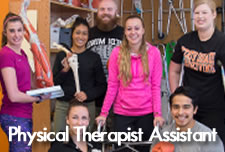Occupational Therapy Assistant
Program Description
Occupational Therapy, a health discipline, provides services to people of all ages whose lives have been disrupted by physical injury, illness, and developmental, psychosocial, or aging-related problems. Occupational therapy practitioners work with individuals to gain or regain the ability to participate in their “daily occupations.” These occupations can include anything that “occupies their time,” such as self-care tasks, social participation, work, play and leisure activities. For example, a person with a disability may need to relearn how to dress, how to safely take a bus, or how to prepare a basic meal in order to restore quality and meaning back into their life.
An Occupational Therapy Assistant works under the direction of an Occupational Therapist and is part of the health care team. Following an established evaluation and treatment plan with goals, the OTA carries out the treatment plan through interventions, adaptions to the environment or education/instruction about the disease process, etc. The OTA collaborates with the OT on treatment planning, progress toward the goals and performs documentation. The OTA confers with other health professionals and is an active member of the health care team.
Occupational therapy assistant students in our program will obtain both didactic and clinical knowledge and experience to effectively perform OT intervention in various OT practice areas. OT practices may include, but are not limited to the following: children with disabilities; teens with depression, adults suffering from a brain trauma, surgery, disease, and injury; and older adults suffering from Parkinson, Dementia or home/workspace adaptations. OTAs are vital in assisting individuals to develop, recover and improve the skills needed for daily living.
Five Year Positive Placement Rate
95%
Idaho Average Salary
$69,630
National Average Salary
$68,170
* Source: O*NET OnLine
Program Overview
- Requires 2 years to complete
- Divided into three components: seated, laboratory demonstrations and practice, and field work
- Field work placements may require working evening or weekend hours, and outside of the local area
- Upon successful completion of the program, the student is prepared to sit for the Occupational Therapy Assistant National Licensure Exam (NBCOT)
- Program requires the successful completion of 69-73 credit hours including prerequisites
- The program has a special application and has competitive entry
The system and rationale for ensuring that the length of study in the OTA program is appropriate to expected learning and competence of the graduate is based on the USDE statement regarding AA degrees. The USDE states that an associate degree can be defined as “an award that requires completion of an organized program of study of at least 2 but less than 4 years of full-time academic study or more than 60, but less than 120 semester credit hours.” (NCES)
The OTA program at ISU fits within the USDE guidelines and also mirrors several associate degrees within our Health Occupations department such as Health Information Technology, Registered Nursing, and PTA. In addition, the OTA program at ISU is similar to several OTA programs across the country in length of study. It is with these considerations that we feel our program is appropriate to the expected learning and competence of the graduate.
Program is located in the Owen Redfield Complex, Building #42, 1151 Red Hlll Rd
Degree Options
- Associate of Applied Science (AAS) (2 years)
- Bachelor of Science in Health Science (4+ years)
- Bachelor of Applied Science (4+ years)
Credentialing Requirements
Ave, Suite 510E, Bethesda, MD 20814. ACOTE’s telephone number c/o AOTA is 301-652-6611 and its Web address is www.acoteonline.org.
Graduates of the program will be eligible to sit for the national certification examination for the occupational therapy assistant administered by the National Board for Certification in Occupational Therapy (NBCOT).
Career Opportunities
- School Districts
- Out-Patient Rehabilitation Clinics
- Home Health Agencies
- Skilled Nursing Facilities
- Hospitals
- Academic Institutions
- Psychiatric Settings
Program Requirements
- Application Process
- High School Diploma or GED
- Students must be qualified for college level coursework in English and Math (See an advisor for details)
- Completion of a criminal background check and drug screening
- Completion of the following courses with a grade of C or better:
- HO 0106 Medical Terminology
- BIOL 1100 Concepts Biology: Human Concerns
-or- - BIOL 1101/L Biology
- General Psychology
- Students must have an overall 2.5 GPA in all classes to apply.
- Students will be required to successfully pass a FBI Background Check once accepted. Students who have a criminal history are strongly encouraged to meet with Student Services or the coordinator of the program before applying to the OTA program.
- Upon acceptance, students must show documentation of a current physical examination and immunizations and have current CPR and Drug Screen.
- Program Demands
Minimum Test Scores
| rSAT | Math: 500 |
| ACT | Math: 19 |
| ALEKS | Math: 30 |





